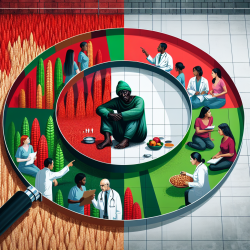Introduction
In the realm of public health, the intersection of racial and ethnic discrimination with food insecurity and poor health outcomes presents a critical area of concern. Recent research published in the International Journal of Environmental Research and Public Health sheds light on this issue, revealing the significant associations between mothers' experiences of discrimination and adverse health and food security outcomes. This blog aims to provide practitioners with insights into these findings and encourage further exploration and implementation of strategies to address these challenges.
Key Findings from the Research
The study, titled Experiences of Racial and Ethnic Discrimination Are Associated with Food Insecurity and Poor Health, examined the experiences of 1,372 mothers with young children in Philadelphia. The research highlights several critical findings:
- Mothers who experienced discrimination in settings such as workplaces and schools had higher odds of food insecurity (HFI) and depressive symptoms.
- Discrimination by police and courts was linked to more than double the odds of HFI.
- Among Latinx mothers, discrimination in schools was associated with nearly 60% higher odds of HFI and 80% higher odds of depressive symptoms.
- The study underscores the need for public health interventions to address systemic racism and discrimination to improve food security and health outcomes.
Implications for Practitioners
As practitioners in the field of speech language pathology and public health, understanding these associations is crucial for creating effective interventions. Here are some ways to incorporate these findings into practice:
- Integrate Cultural Competency: Enhance your practice by incorporating cultural competency training to better understand and address the unique challenges faced by racially and ethnically diverse populations.
- Advocate for Policy Change: Engage in advocacy efforts to promote policies that address systemic racism and discrimination, which are root causes of health disparities.
- Collaborate with Community Organizations: Partner with local organizations to provide holistic support to families, addressing both health and food security needs.
- Conduct Further Research: Encourage further research to explore the nuances of discrimination's impact on health and food security across different racial and ethnic groups.
Conclusion
The findings from this research emphasize the urgent need to address racial and ethnic discrimination as a public health crisis. By integrating these insights into practice, practitioners can play a pivotal role in mitigating the adverse effects of discrimination on health and food security. For those interested in delving deeper into this topic, I encourage you to read the original research paper: Experiences of Racial and Ethnic Discrimination Are Associated with Food Insecurity and Poor Health.










